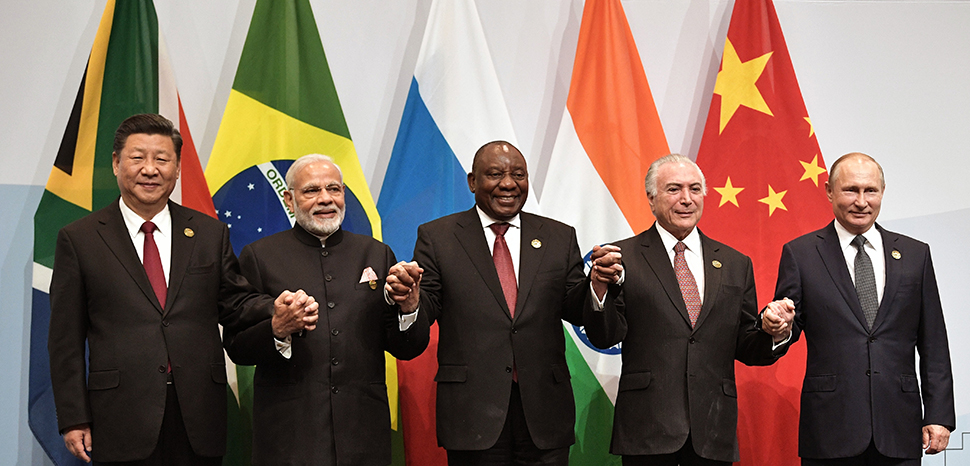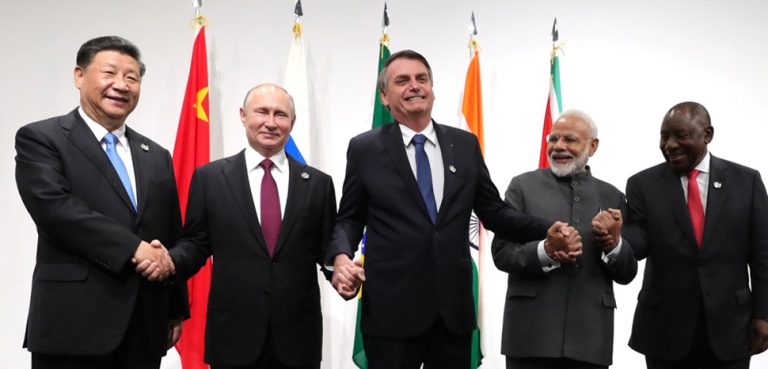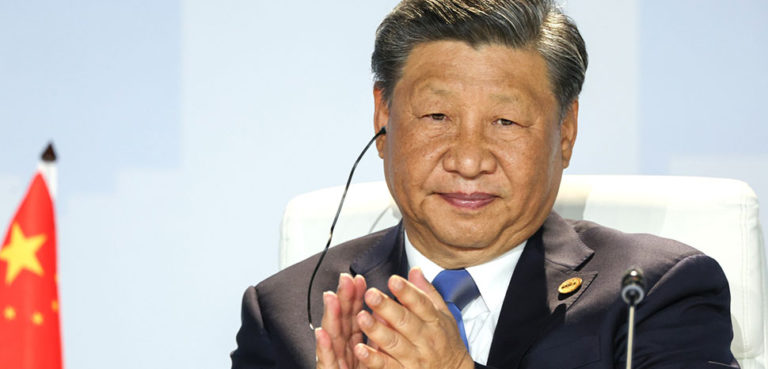BRICS expansion will be on the docket when the bloc meets for its upcoming summit in South Africa, and the recent election of former Brazilian President Dilma Rousseff as president of BRICS’ New Development Bank, brings renewed attention to this five-member organization’s future. The expansion of the BRICS has been widely discussed and analyzed; potential future members include Argentina, Indonesia, Iran, Turkiye, and Saudi Arabia. “There are over a dozen countries that have knocked on the door,” said South Africa’s Ambassador Anil Sooklal, “we are quite advanced at looking at a further group of new members.”
In this commentary, we will discuss the potential BRICS membership of Kazakhstan. Kazakhstan, a country rich in natural resources, is a critical player in Central Asia and a potential strategic partner for BRICS countries. However, to improve their relations with Kazakhstan, the BRICS should aim to increase engagement with Astana.
A blueprint for increasing relations
Kazakhstan already borders two BRICS states (Russia and China), generally has good and close relations with India, and, at the very least, has cordial, though limited, ties with Brazil and South Africa. However, new developments must occur for the Kazakhstani government to be more interested in joining the BRICS.
Firstly, increasing trade relations between Kazakhstan and the BRICS should be a priority. For example, despite Kazakhstan’s exports worth USD$50.9 billion in 2020, the total trade between Kazakhstan and BRICS countries in 2021 “exceeded 45 billion US dollars, with plenty of room for expanding the volume in the years ahead,” according to Kazakhstani President Kassym-Jomart Tokayev in June 2022. To boost volume, BRICS countries should aim to increase trade with Kazakhstan to at least $50 billion by 2025 by reducing trade barriers and increasing investment in critical sectors such as energy, agriculture, and mining. Such a development would be welcome, as Astana is looking to diversify the country’s economy to move away from a reliance on its energy and mining industry.
Secondly, enhancing cultural exchange between Kazakhstan and BRICS countries should be another priority. Kazakhstan is a multicultural country with a rich history and heritage that should be showcased. One way to achieve this is by organizing cultural exchange programs, such as film festivals and cultural weeks, to showcase the culture and films of BRICS countries, as well as the culture, music, dance, and literature of Kazakhstan. People-to-people relations between Kazakhstan with China and Russia exist, but more can be done with other BRICS nations. For example, the Kazakhstani ethno-folk ensemble Turan could tour Brazil to promote Kazakhstan’s music.
South Africa is one of the few nations in the African continent where Kazakhstan has an embassy. While bilateral relations are limited, defense and engineering companies from the two countries have teamed up to develop the Barys 8×8 armored personnel carrier. In March, Kazakhstan’s new ambassador to South Africa, Yerkin Akhinzhanov, presented his credentials; we will have to see if bilateral relations increase during his tenure. Meanwhile, the major highlight in bilateral relations between Brasilia and Astana is a legal case between the Brazilian aerospace company Embraer against Astana.
Thirdly, and following the second argument, strengthening people-to-people ties is essential for improving international relations. To achieve greater connections, BRICS countries should aim to increase tourism to Kazakhstan, which received 8.5 million international tourists in 2019, though the number drastically decreased due to the pandemic. BRICS countries can work together to promote Kazakhstan as a tourist destination by showcasing its natural beauty, culture, and heritage. Additionally, educational exchanges between Kazakhstan and BRICS countries can be strengthened by offering more scholarships to Kazakh students to study in BRICS countries. For example, some seven thousand Indian students are enrolled in Kazkahstani universities, but the number can constantly improve.
Lastly, the BRICS should increase their investment in Kazakhstan’s energy and mining sectors, along with infrastructure, such as roads, railways, and airports (Beijing is already a key investor via the Belt and Road Initiative). Kazakhstan plans to expand its oil production to 100 million tons by 2025, making it a prime target for investment. Therefore, BRICS countries should aim to invest at least $10 billion in Kazakhstan’s energy and mining sectors by 2025, which will benefit Kazakhstan and contribute to the economic growth of BRICS countries.
Will Kazakhstan join BRICS?
The Kazakhstani government has a generally positive attitude towards joining the BRICS. Last June 2022, Kazakhstani president Kassym-Jomart Tokayev participated in a BRICS virtual conference; in his remarks, the Kazakhstani president explained, “Kazakhstan regards BRICS as a truly influential organization and a key growth engine for the world economy. Kazakhstan has a vital interest in developing a vibrant partnership with BRICS countries.” The head of state also noted that he sees “a lot of potential in the ‘BRICS plus,’ ‘One Belt, One Road’ and the Greater Eurasian Partnership initiatives ushering a new era of growth and connectivity.”
The South African government, which holds the rotating chair of the bloc this year, has stated that expansion will be a priority. Therefore, August is the month to watch, as the BRICS will hold a summit in Durban, South Africa, and expansion will be discussed. However, at the time of this writing, there is no official confirmation whether the BRICS countries will vote at the summit, or anytime soon, to invite new members.
To what degree the BRICS want an expansion of the bloc is an issue that deserves more analysis. Beijing, Johannesburg, and Moscow want the bloc to expand, but the two other members are reportedly skeptical. For example, an insightful 15 February 2023 Bloomberg report explains, “While Brazil agrees with the principal of expanding, the nation is still considering its position and is wary of the group being geographically tilted toward Asia,” meanwhile “India doesn’t want countries to be allowed to join on the recommendations of existing members and wants a process established so that nations have to meet certain criteria to be admitted.” In other words, Kazakhstan’s potential membership in BRICS does not depend solely on Astana’s interest, which does exist, but also on whether all BRICS members will accept the Central Asian powerhouse.
Conclusions
The potential expansion of BRICS continues to attract attention and incite debate. This is unsurprising as additional membership would alter the bloc’s composition and have global ramifications. Recent analyses address how a larger BRICS could affect the global economy and whether BRICS can become an “alternate power bloc.”
If Kazakhstan becomes a member, the Central Asian nation will bring to BRICS energy industries, significant energy resources, a young and ambitious population, a government that aims to become carbon neutral by 2060, access to the Middle Corridor (also known as the Trans-Caspian International Transport Route) and a country that has a generally good international image.
The Central Asian government already has good relations with all BRICS nations (particularly China, India, and Russia). By increasing engagement with Kazakhstan through trade, cultural exchange, people-to-people ties, and investment, BRICS countries can further improve their relations with Kazakhstan. Whether increased Kazakhstan-BRICS relations will lead to Kazakhstani membership in the bloc remains to be seen. The upcoming BRICS summit in South Africa in August should be closely monitored, given that the bloc’s future membership will be on the agenda.
Wilder Alejandro Sánchez is an analyst of defense and geopolitical issues in the Western Hemisphere, Eastern Europe, and Central Asia. He is the president of Second Floor Strategies.
Radomir Romanov is the editor and publisher of a current affairs program for newsography.com. He is a member of the “China-Russia Friendship Association,” an interregional public organization.
The views expressed in this article belong to the authors alone and do not necessarily reflect those of Geopoliticalmonitor.com.




